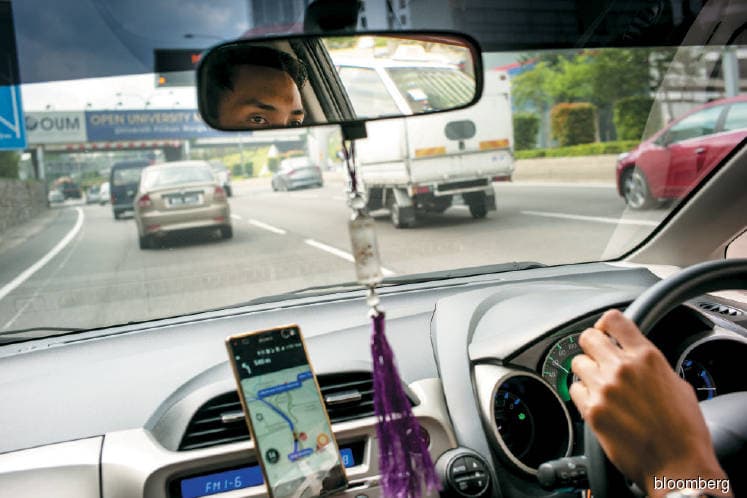
This article first appeared in The Edge Malaysia Weekly on April 2, 2018 - April 8, 2018
CUSTOMERS and drivers of e-hailing service providers have bemoaned the acquisition of Uber Technologies Inc’s Southeast Asian business by Grab Holdings, which has been described as one of the largest tech deals in the region. The move, they say, will substantially reduce choices in the market.
Since the deal was announced last Monday, drivers have voiced concerns in the media about lower income, stricter rules and fewer incentives.
The announcement came after months of speculation. Uber will have a 27.5% stake in Grab, and the former’s CEO Dara Khosrowshahi will join Grab’s board.
Media reports have said Grab is valued at about US$6 billion after the latest fundraising in January when it raised US$2.5 billion, the bulk of it from its largest shareholders, SoftBank Group Corp and Didi Chuxing.
This values Uber’s Southeast Asian business at about US$1.65 billion, although some sources say the value could be as high as US$2 billion.
Grab group CEO and co-founder Anthony Tan said in a statement that the combined business is the leader in platform and cost efficiency in the region. “Together with Uber, we are now in an even better position to fulfil our promise to outserve our customers,” he said.
Last November, in announcing its one-billionth ride, Grab said it controlled 95% of the third-party taxi-hailing and 72% of the private vehicle hailing market in Southeast Asia.
Uber’s share of the private vehicle hailing market in the region is not known. However, it is not far-fetched to say that combined, the merged entity would have monopolistic control over both the third-party taxi hailing and private vehicle hailing market in the region.
A check on Samsung’s Play Store reveals a number of other e-hailing service providers such as EzCab, Public Cab, Swift Limousine & Cab, 2GO, HelloTeksi and iTeksi. EzCab, the largest among these, only had about 10,000 downloads, compared with 68 million for Grab.
While the Grab-Uber merger creates a dominant e-hailing player in Malaysia, it is not illegal or anti-competitive.
“Being a dominant player in itself is not illegal in Malaysia because our Competition Act does not cover mergers and acquisitions, unlike similar laws in other countries such as Singapore, the Philippines and Indonesia,” says Nicole Leong, senior legal associate at Tay & Partners.
“The question is, will they abuse their dominant position post-merger with Uber?” she says when contacted by The Edge. An example of this would be forcing an exclusivity contract on drivers and charging passengers excessive prices when there is no other decent and suitable alternative, she explains.
According to SK Chambers founder Shanti Kandiah, however, a market analysis must be carried out to see how much of the e-hailing market is dominated by Grab-Uber and whether they are included in the larger public transport network.
“What options consumers have to get from point A to point B should also be included in the analysis before one can call the merged entity a dominant player in e-hailing or in the public transport system,” she explains.
Across the Causeway, the Competition Commission of Singapore (CCS) says it can ask for the merger to be modified or even unwound if it finds that competition in the e-hailing market is being eroded. This is because the CCS is empowered by a competition law that prohibits mergers that may result in a substantial lessening of competition. Uber and Grab are the dominant players in the e-hailing market in Malaysia and Singapore.
However, there is nothing the Malaysian Competition Commission (MyCC) can do to block or unwind the merger because it is not equipped with such powers by the Competition Act 2010.
The Act, which was enacted to liberalise the Malaysian market and curb monopolistic and anti-competitive action by corporations, is akin to a two-legged stool as it lacks provisions to block or unwind anti-competitive M&A.
According to legal practitioners, anti-competitive laws in many countries usually cover three aspects: anti-competition agreements by companies, abuse of dominant positions, and control over M&A that could be deemed anti-competitive.
“The big difference between the Malaysian and Singaporean anti-competitive laws is that the latter provide for merger control,” says Shanti.
In a statement following the announcement of the Grab-Uber deal, MyCC says it will be closely monitoring the e-hailing market post-merger to ensure that competition is not disrupted.
“The commission strongly believes in promoting and protecting the process of competition [and] will not hesitate to intervene if any anti-competitive conduct is found to be disrupting competition in the e-hailing market,” it said.
Meanwhile, Grab and Uber are working together to promptly migrate Uber drivers and riders, Uber Eats customers, merchant partners and delivery partners to the Grab platform. The Uber app will continue to operate for two weeks from March 26 to ensure stability for Uber drivers.
UberEats will run until the end of May, after which Uber’s delivery and restaurant partners will move to the GrabFood platform, Grab said in its announcement of the merger.
Save by subscribing to us for your print and/or digital copy.
P/S: The Edge is also available on Apple's AppStore and Androids' Google Play.